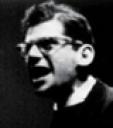 So, Allen Ginsberg comes to Portland in 1956 with his friend Gary Snyder and they spend a couple of days at Reed College. He’s 29 and just about as full of desire as a human can be. He wants to touch the firmament and he wants to savor the most exotic pleasures of the flesh, he wants to be the greatest poet ever and he wants everyone to know it, he wants to drink with the gods and use the hangover to prove that he’s caroused with them. And what separates him from just about every other ambition-drenched artist out there is that in 1956 he is carrying “Howl” in his pocket, and all the contradictions, the spirit and the flesh, the yearning for desirelessness, the hunger to be both participant and observer at the same time, have been resolved, temporarily, on the page. After reading several shorter poems on the second night, he turns to “Howl.” And, well, you should check it out.
So, Allen Ginsberg comes to Portland in 1956 with his friend Gary Snyder and they spend a couple of days at Reed College. He’s 29 and just about as full of desire as a human can be. He wants to touch the firmament and he wants to savor the most exotic pleasures of the flesh, he wants to be the greatest poet ever and he wants everyone to know it, he wants to drink with the gods and use the hangover to prove that he’s caroused with them. And what separates him from just about every other ambition-drenched artist out there is that in 1956 he is carrying “Howl” in his pocket, and all the contradictions, the spirit and the flesh, the yearning for desirelessness, the hunger to be both participant and observer at the same time, have been resolved, temporarily, on the page. After reading several shorter poems on the second night, he turns to “Howl.” And, well, you should check it out.
Reed College has now posted the audio tape of Ginsberg’s reading of “Howl” at the college in 1956. It’s offering a range of options (from the master tape unedited including several other poems and Ginsberg’s intro to “Howl” to an edited version of “Howl”). For the most concentrated dose, go straight to the edited “Howl.” He starts out slowly, deliberately, in a youthful version of the nasal tones that only became nosier as he aged. It picks up. Faster. Higher pitched. More intense. This isn’t the final published version of “Howl” (which wasn’t finally reached until 1986): If you follow along with the printed page, he skips around, changes the order, drops some phrases and adds others. But, after rather lackadaisically making his way through the other poems that preceded “Howl” that night (and available at the site, too), he is fully engaged with the text. He KNOWS it’s good, and tries to live up to it with his reading, even though the crowd is small (though responsive, laughing at some of the more delightfully over-the-top moments in the poem). And I was laughing too.